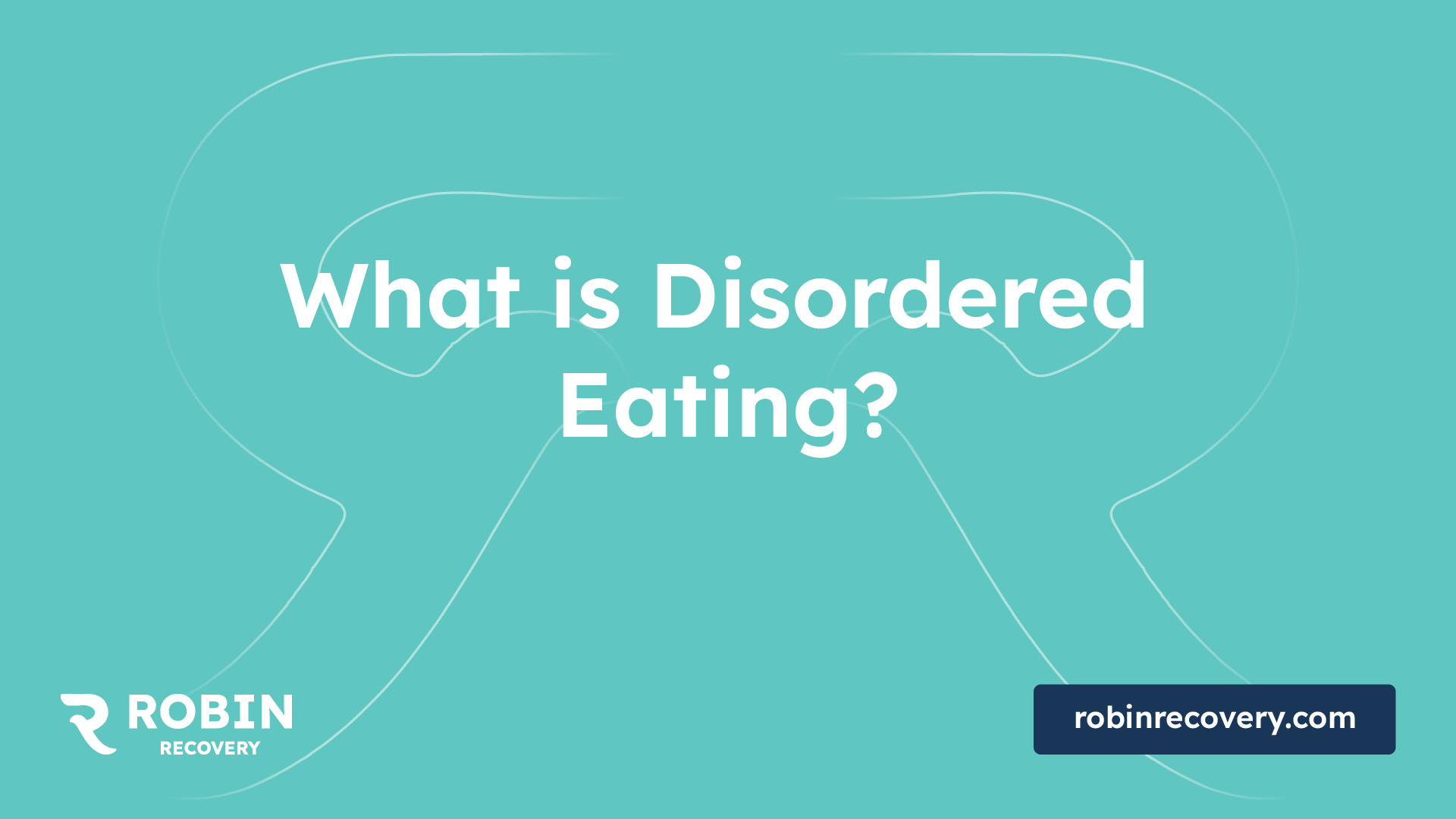What is Disordered Eating?

Understanding Disordered Eating
Definition and Overview
Disordered eating encompasses a spectrum of problematic eating behaviors and distorted attitudes towards food, weight, shape, and appearance. It can manifest as dieting, skipping meals, fasting, restricting food intake, eliminating specific foods or food groups, binge eating, excessive use of diuretics, laxatives, weight loss medications, purging, and excessive exercising. Importantly, these behaviors do not meet the frequency, duration, and psychological criteria necessary for a diagnosable eating disorder [1].
According to experts, disordered eating is a serious concern that can lead to significant emotional and physical health issues. While individuals may not fit the criteria for an eating disorder, their relationship with food can still be deeply troubled.

Signs and Symptoms
The symptoms of disordered eating can vary widely but may include:
Sign/SymptomDescriptionWeight ChangesSignificant fluctuations in weight, either loss or gain.Fear of Weight GainAn intense fear of gaining weight or becoming overweight.Out of ControlFeelings of being unable to control eating habits.Strict DietingEngaging in rigid dieting behaviors without nutritional guidance.Emotional DistressExperiencing psychological and emotional turmoil related to food, eating, and body image.
These behaviors can pose serious health risks. Individuals with disordered eating may experience a higher likelihood of developing obesity and eating disorders as well as complications such as bone loss, gastrointestinal issues, electrolyte imbalances, low heart rate and blood pressure, heightened anxiety and depression, and social isolation. Many of these health issues may go unnoticed or underestimated by those engaging in disordered eating patterns [2].
Recognizing these signs is important for individuals and their loved ones to seek appropriate support and resources. For more information on support options, consider exploring our resources on national eating disorders awareness week and time to talk day.
Seeking Help for Disordered Eating
Addressing disordered eating is crucial for recovery and health. This section focuses on treatment providers and available support options for individuals seeking help.
Treatment Providers
When someone is looking for help regarding disordered eating, connecting with specialized treatment providers is essential. These professionals can offer tailored approaches to address eating behaviors effectively. Treatment options may include:
Provider TypeDescriptionTherapists and CounselorsMental health professionals specializing in eating disorders or general counseling services. They can provide psychotherapy and support. What is Talk Therapy?Registered DietitiansNutrition specialists who offer guidance on meal planning and healthy eating habits, crucial for recovery.PsychiatristsMedical doctors who can prescribe medication if necessary and address mental health concerns related to eating behaviors.Support GroupsPeer-led meetings providing a space for sharing experiences. These can be invaluable for emotional support.
Learning about these options can clarify how to effectively manage disordered eating. The National Eating Disorders Association provides a comprehensive resource for finding an eating disorder treatment provider.
Support Options
In addition to professional treatment, individuals may seek various support options that promote recovery without financial burden. These include:
Using these support options can enhance recovery efforts and provide the guidance necessary for individuals confronting the challenges of disordered eating.
Tools for Recovery
Finding the right tools for recovery is essential for individuals seeking to understand and address disordered eating. There are numerous resources available to provide support and guidance.
National Eating Disorders Association Resources
The National Eating Disorders Association (NEDA) serves as a valuable resource for anyone grappling with the complexities of disordered eating. NEDA offers a variety of options, including:
Financial barriers should not prevent individuals from seeking these essential supports; both free and low-cost options are available to help guide recovery efforts.
Fay Nutrition Counseling
Fay Nutrition Counseling specializes in providing tailored nutrition therapy for individuals struggling with eating disorders and disordered eating patterns. Here are some key offerings:
These resources are instrumental in addressing the question of what is disordered eating? and help individuals navigate their path to recovery while tackling associated health risks such as anxiety, depression, and potential social isolation.
Treatment Approaches
Addressing disordered eating often involves multiple methods, including psychotherapy and nutrition education. These treatment approaches are essential for recovery and help individuals develop healthy eating habits and coping strategies.
Psychotherapy and Counseling
Psychotherapy, often referred to as talk therapy, is a fundamental aspect of treating eating disorders. It is typically conducted by a psychologist or another mental health professional who specializes in this area. The therapy process can span from months to years and is vital for helping individuals recognize triggers that lead to unhealthy eating behaviors, such as bingeing or purging. The support received can foster a healthier relationship with food and body image [4].
Several therapeutic modalities can be effective, including Cognitive Behavioral Therapy (CBT), which focuses on changing negative thought patterns related to food and self-image. Building coping skills to manage stress and anxiety is also a crucial component of psychotherapy.
Nutrition Education
Nutrition education is another critical aspect of disordered eating treatment. Registered dietitians with specialized training in eating disorders play a pivotal role in this area. They help individuals understand their eating disorder and develop personalized plans for healthy eating habits [4].
Through nutrition education, individuals learn about balanced diets, the importance of various food groups, and how to listen to their body’s hunger and fullness cues. This knowledge empowers them to make informed decisions about their eating behaviors and promotes long-term recovery.
Summary of Treatment Approaches
Treatment ApproachDescriptionPsychotherapyTalk therapy led by a mental health professional helps individuals identify triggers and develop healthier coping strategies.Nutrition EducationPrograms provided by dietitians focused on understanding eating disorders and developing practical healthy eating plans.
Integrating psychotherapy and nutrition education forms a comprehensive approach to understanding disordered eating, as the psychological and nutritional aspects of recovery are both essential. Individuals seeking help can benefit considerably from these approaches as part of their journey to overcome eating disorders. For more insights and support, awareness events like National Eating Disorders Awareness Week and Time to Talk Day provide valuable resources and community connections.
Medication and Hospitalization
Role of Medicines
Medicines can play a supportive role in the treatment of eating disorders, but they are not a standalone solution. Often, medications are most effective when combined with psychotherapeutic approaches, such as talk therapy. Antidepressants are commonly prescribed for individuals struggling with eating disorders that involve binge eating behaviors, such as bulimia or binge-eating disorder. These medications help to manage mood and anxiety, which can be significant factors in disordered eating patterns.
It is important to note that medications are generally not recommended for individuals who are underweight due to their eating disorder. The complications associated with inadequate nutrition can impact how medications work, potentially leading to ineffective treatment or adverse effects.
Medication TypeCommon UsesNotesAntidepressantsBulimia, binge-eating disorderShould not be used if underweight
Hospital Stay Considerations
In certain situations, a hospital stay may be necessary for individuals facing severe physical or mental health issues linked to their eating disorder. This includes those who may be struggling to eat or gain weight effectively. The primary aim of hospitalization is to address immediate medical concerns and start improving eating behaviors and weight before transitioning to outpatient treatment [4].
Hospital stays can provide structure and intensive support, allowing healthcare teams to monitor vital signs, nutritional intake, and mental health status. The environment of a treatment facility can also help stabilize emotional distress, setting the foundation for long-term recovery.
ConsiderationDetailsDurationVaries based on individual needsFocusStabilization of medical conditions, nutritional education
Overall, understanding the role of medications and instances requiring hospitalization can aid individuals and families in navigating the complexities of recovery from disordered eating. Recognizing such interventions is crucial in promoting long-term health and well-being. By seeking help early and addressing disordered eating patterns, individuals can mitigate risks associated with this complex issue.
Preventing Eating Disorders
Early Intervention
Early intervention is crucial in preventing disordered eating behaviors from escalating into more severe eating disorders. Addressing unhealthy eating patterns or behaviors at the earliest signs can significantly reduce the risks associated with disordered eating. This proactive approach includes recognizing the warning signs, such as changes in eating habits, increased secrecy around food, and fluctuations in weight. According to the National Eating Disorders Association, these early signs might encompass a wide range of behaviors including anorexia nervosa, bulimia nervosa, binge eating disorder, and various other specified feeding or eating disorders (OSFED).
Individuals experiencing negative influences, such as societal standards or body dissatisfaction, may benefit from open discussions about their feelings and behaviors around food. Intervening early allows for the opportunity to cultivate a healthier relationship with food and body image, helping to mitigate the risk for future complications associated with more severe eating disorders. For instance, the portrayal of the “thin ideal” in media can heighten body dissatisfaction, making early awareness and intervention even more critical [5].
Professional Guidance
Professional guidance plays a vital role in preventing and treating disordered eating. Engaging with qualified treatment providers, including psychologists, dietitians, and counselors specializing in eating disorders, can provide valuable support. These professionals offer tailored interventions that address the individual’s unique experiences and needs surrounding food and body image.
Therapies such as cognitive behavioral therapy (CBT) can help individuals challenge and modify negative thoughts related to food and body image (What is Talk Therapy?). Nutrition education delivered by registered dietitians can also provide practical strategies for maintaining balanced eating habits without strict dieting, which has been linked to disordered eating [5].
Engaging in community support initiatives, such as National Eating Disorders Awareness Week or joining support groups, can foster understanding and connection among individuals navigating similar challenges. Establishing a comprehensive support network rooted in professional guidance and community interactions enhances the chances of preventing disordered eating patterns and promoting healthy, lasting relationships with food and body image.
References
[2]:
[3]:
[4]:
[5]:
